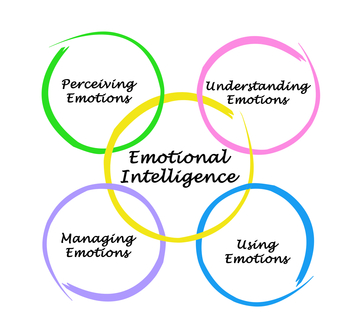Emotional Intelligence
Emotional intelligence (EI) has become one of the hottest buzzwords in corporate America. When you open your eyes and look around, there are a lot of examples and anecdotes that may come to mind. Here is an example that drives home the concept of emotional intelligence in the workplace.
Many executive assistants have a high degree of emotional intelligence. They respond to subtle cues and react appropriately. Moreover, executive assistants quickly learn what an executive needs, what their strengths and weaknesses are, what might trigger anger or stress, and how to best accommodate his or her personal style. During my tenure at a large organization, the two senior-most executive assistants had very different personalities. One of them was emotionally intelligent and the other wasn’t. The President’s assistant was always uptight, unorganized, panicked under stress, and did not take accountability for her mistakes or behavior. Oftentimes she would yell at the other assistants. In stark contrast, nothing rattled the other executive assistant. The Chairman’s assistant had a strong personality and was professional, articulate, decisive, sociable, and always remained calm under pressure.
What is Emotional Intelligence?
 In a nutshell, emotional intelligence is the ability to understand and manage one’s own moods and emotions and the moods and emotions of other people. When individuals experience stressful feelings and emotions, emotional intelligence enables them to understand why and helps them manage these feelings so they do not get in the way of effective decision making. Individuals with high EI are proven to be effective leaders as they are empathetic, self-aware and hold themselves accountable to how their behavior influences those around them.
In a nutshell, emotional intelligence is the ability to understand and manage one’s own moods and emotions and the moods and emotions of other people. When individuals experience stressful feelings and emotions, emotional intelligence enables them to understand why and helps them manage these feelings so they do not get in the way of effective decision making. Individuals with high EI are proven to be effective leaders as they are empathetic, self-aware and hold themselves accountable to how their behavior influences those around them.
Emotional intelligence also plays an important role in how leaders relate to and deal with their followers, particularly when it comes to encouraging followers to be creative. People often talk about creativity in terms of artistic expression. For most people; however, creativity comes from solving the problems we all encounter every day. Creativity involves coming up with something that challenges the status quo. Oftentimes people feel more comfortable sticking to a familiar routine rather than thinking outside the box and heading down an unfamiliar path. Attempting to create something new is often accompanied by anxiety, fear, and uncertainty.
Leaders can either encourage or discourage employees from taking risk to come up with new ideas. Moreover, leaders can also create a favorable work environment that stimulates creativity. Leaders with high levels of emotional intelligence will excel at stimulating and encouraging their followers to act on opportunities that enable creativity to flourish in organizations.
Primary Dimensions of Emotional Intelligence
Researchers have identified five primary dimensions required for effective emotional intelligence:
- Self-Awareness – This can be defined as having the ability to recognize and understand your own moods and emotions as well as their effects on others.
- Self-Regulation – This is also known as discipline. It’s the ability to control or redirect disruptive impulses and emotions, thinking before acting, taking responsibility for your behavior, and adapting to change.
- Empathy and Compassion – Empathy is the ability to put yourself in someone else’s shoes and understand how they may feel or react in certain situations. The more skilled you are in recognizing and anticipating other people’s needs or what motivates or upsets them, the better we can relate to others.
- Motivation – Motivation is a passion or internal drive that goes beyond the extrinsic value of money in order to pursue your goals with energy. In order to motivate yourself for any achievement whether professional or personal, you will need clear objectives, a positive attitude, commitment, initiative, optimism, and the desire to achieve.
- Social Skills – Developing good interpersonal skills and cultivating productive relationships is essential to one’s ability to gain higher emotional intelligence and will equal success in your life and career. You must have the ability to effectively communicate clearly and concisely while working with others towards reaching common goals.
In conclusion, the moods and emotions leaders experience on the job, and their ability to effectively manage these feelings can influence their effectiveness as leaders. Emotional intelligence is a critical tool that has the potential to contribute to leadership effectiveness in multiple ways including encouraging and supporting creativity among followers, exceeding goals, and developing and/or improving relationships.


